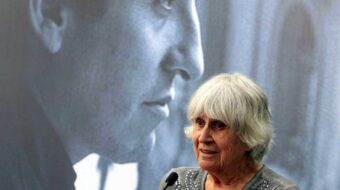
Best of the Chicago International Film Festival
CHICAGO – The master of social realism, British director Ken Loach, was outdone last month at the 45th annual Chicago International Film Festival. Known for his penetrating human dramas (“Ladybird, Ladybird,” “Riff Raff,” “Raining Stones”) Loach this year offered a lighthearted fantasy, “Looking for Eric.” This is the film Loach pulled from the Melbourne Festival in support of the Israeli cultural boycott. It’s about a stressed father dealing with the pressures of a broken marriage and troubled stepchildren. But uncharacteristic of Loach, an apparition appears in the form of famous soccer star/philosopher Eric Cantona, to help coach the troubled father to a happy ending.
Happy endings were nonexistent in most of the festival’s other social realist dramas, which seem to be multiplying with the growing pressures of surviving in the new economic climate.
“Don’t Let Me Drown” is a touching and realistic update of “Romeo and Juliet,” this time with a Puerto Rican boy and an African American girl. Set in New York just after the attack on the World Trade Center, the story takes on added significance as the sister of “Juliet” died in the building. The father of “Romeo” is a janitor who consumes toxic fumes while helping to clean up the debris from the disaster. Both sets of parents carry racist beliefs fueled by the trauma caused by the aftermath of the tragedy. The actors deliver an unbelievably realistic portrayal of people dealing with extreme stress but trying to find life and love.
Move to England and the problems are not much different. In “Fish Tank,” the film closest to the Loach style, Mia lives with her sister and mother in cramped quarters in a seedy part of London. Her alcoholic mother brings home a boyfriend who ends up raping Mia. Actress Katie Jarvis delivers an amazing performance as a troubled teen forced to deal with an oppressive environment, and director Andrea Arnold paints a powerful image of the working class in England. The film received top honors at Cannes.
A rare film from the Bahamas, “Rain,” tells the touching story of a 14-year-old girl sent to live with her mother in Nassau after her loving grandmother dies. Dropped into a strange and difficult environment, Rain fights to maintain her dignity against the harsh realities of her mother’s drug-addicted and crime-infested neighborhood. A school gym teacher takes her under her wings and trains her to be a runner, allowing the child a rare opportunity to escape from the harsh and deadly realities of the Third World. First-time feature director Marla Govan offers a well-acted and powerful film.
“Backyard” is a drama that follows several documentaries that addressed the same urgent story. Hundreds of women have been murdered over the last few years in Juarez, Mexico, just across the border from Texas. A new female police captain is the latest charged with the task of solving the long string of murders, but instead she is confronted with government and police collusion and corruption. The hard-hitting action story ties the murders to the harsh economic realities caused by the loss of jobs in this maquiladora town. The city government attempts to cover up the murders to protect the image of the town, but the big factories are leaving for cheaper labor elsewhere.
Highly visible films that were also shown at the Toronto Film Festival and offer themes of harsh realities include “Precious,” based on the novel “Push” by Sapphire, about an overweight African American teenage girl struggling with an unbearable mother, a father who has impregnated her twice, and the fact that she is still unable to read or write. The film has received strong attention for its direction and astounding performance by Gabourey Sidibe. “Antichrist,” the latest from master Lars von Trier, challenges the viewer to experience the most brutal and gut-wrenching relationship between two parents, devastated by the loss of their child, that has ever been filmed. Progressive director Von Trier, recovering from a long bout of depression, is holding off on the third part of his American trilogy, after making the shockingly memorable “Dogville” and “Manderlay.”
Several other films screened in Chicago deserve recognition as ones progressives should see. “Mississippi Damned” is a powerful portrayal of a troubled African American family; the Mexican film “Daniel and Anna” addresses the effects of the criminal world of underground pornography; and all the way around the world in Japan, director Sabu directs the filmic version of the classic 1929 communist novel “Kanikosen,” a visual feast in the belly of the beast.
And not to be overlooked is “Videocracy,” the scathing exposé of the Berlusconi TV empire; “Cooking History,” a unique study of modern wars as seen from the kitchens and the chefs who served the military; and last but not least, one of the great new Woody Harrelson flicks, “The Messenger,” an antiwar film with no blood and not one gunshot. It’s a tragic drama about two officers assigned to deliver the fatal news to parents of the deceased.
Photo: “Don’t Let Me Drown,” set in New York just after Sept. 11, 2001.

MOST POPULAR TODAY


Zionist organizations leading campaign to stop ceasefire resolutions in D.C. area

Communist Karol Cariola elected president of Chile’s legislature

Afghanistan’s socialist years: The promising future killed off by U.S. imperialism

High Court essentially bans demonstrations, freedom of assembly in Deep South






Comments